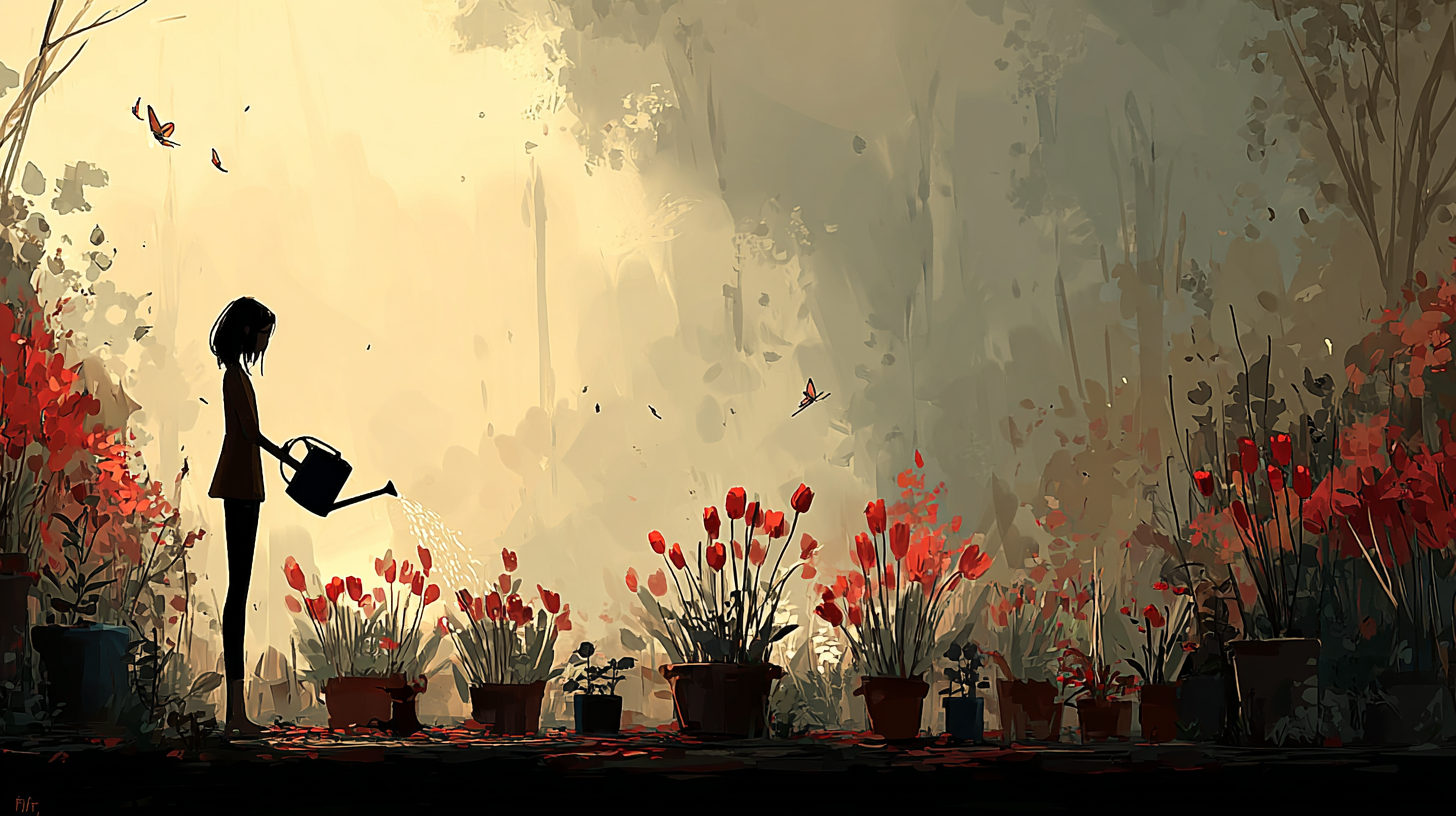“Bloom” means flowers appear or a flower that is open and beautiful.
「bloom」は「花が咲くこと」や「咲いている花」を表す言葉です。
以下は英単語 “bloom” に関するストーリー型学習コンテンツです。まずは大枠の意味を理解して最後の文章で確認しましょう。
「bloom」の主な意味(main meaning)
| 品詞 | 発音記号 | 意味(簡潔な英語定義) | 英語例文 |
|---|---|---|---|
| 動詞 | /bluːm/ | to produce flowers | The roses bloom in spring. |
| 名詞 | /bluːm/ | a flower, especially one cultivated for its beauty | She placed a single bloom in the vase. |
「bloom」の語源(etymology)
「bloom」は中期英語 blome に由来し、古ノルド語 blóm(花)にさかのぼります。「開く」「美しくなる」というイメージが核です。
「bloom」の類義語(synonyms)
| 類義語 | 英語例文 |
|---|---|
| blossom | The cherry trees blossom in April. |
| flower | The garden is full of flowers in summer. |
| flourish | Her talent began to flourish after moving to the city. |
| thrive | The plants thrive in sunny spots. |
| bud | The buds on the tree are starting to open. |
「bloom」の反義語(antonyms)
| 反義語 | 英語例文 |
|---|---|
| wilt | The flowers wilted in the heat. |
| fade | The color of the petals began to fade. |
「bloom」のコロケーション(collocations)
| コロケーション | 英語例文 |
|---|---|
| in full bloom | The garden is in full bloom. |
| bloom beautifully | The roses bloom beautifully every year. |
| spring bloom | We always look forward to the spring bloom. |
| bloom early | These tulips bloom early in the season. |
| late bloom | This variety has a late bloom. |
「bloom」の2項表現(binomials)
| 2項表現 | 英語例文 |
|---|---|
| bloom and grow | With love and care, children bloom and grow. |
| rise and bloom | She managed to rise and bloom despite the difficulties. |
英語ストーリー(english story)
Title: A Garden of Hope
Mika had just moved to a small town to start a new job at a local flower shop. She had always loved plants and dreamed of a life surrounded by color. The shop was called “In Full Bloom,” and it was known for its beautiful roses and tulips. Every morning, she arrived early to water the plants and check if any new flowers had bloomed.
One day, an elderly woman named Mrs. Sato came in looking for a single bloom to place by her husband’s picture. Mika carefully selected a bright pink rose and handed it to her. Mrs. Sato smiled and said, “He always loved roses in full bloom.”
As weeks passed, Mika’s skills began to flourish, and customers noticed how the shop seemed more cheerful. The plants thrived under her care, and even the shy buds started to open earlier than usual. Her boss said, “You really know how to make things bloom beautifully.”
But not everything was perfect. During a heatwave, many flowers began to wilt. Mika was worried, but she worked hard, watering them carefully and giving them shade. After a few days, the garden recovered, and the colors came back stronger than before.
One little boy, visiting with his mother, pointed to the flowers and said, “Mom, look! They’re blooming again!”
Mika realized then that flowers and people are not so different—they both need care, patience, and a little hope to bloom and grow.
和訳
希望の庭
ミカは小さな町に引っ越して、地元の花屋で新しい仕事を始めた。ずっと植物が好きで、色に囲まれた生活を夢見ていた。店の名前は「イン・フル・ブルーム(In Full Bloom)」で、美しいバラやチューリップで知られていた。毎朝、彼女は早く店に来て植物に水をやり、新しい花が**bloomed(咲いている)**かを確認した。
ある日、サトウさんという年配の女性が一輪の**bloom(花)**を買いに来た。亡き夫の写真のそばに飾るためだった。ミカは明るいピンクのバラを選んで渡した。サトウさんは微笑んで言った。「彼は満開のバラが大好きだったの。」
数週間が経ち、ミカのスキルはflourish(伸び始め)、お店が前よりも明るくなったことにお客さんたちが気づいた。植物たちはミカの世話の下でthrived(元気に育ち)、つぼみもいつもより早く開き始めた。店主は言った。「君は本当に花を**bloom(咲かせ)**せるのが上手だね。」
でも、すべてが順調だったわけではない。猛暑の日が続き、多くの花が**wilt(しおれ)**始めた。ミカは心配になったが、丁寧に水をやり、日陰を作ってあげた。数日後、庭は元気を取り戻し、色とりどりの花が再び咲き始めた。
ある日、母親と一緒に来た男の子が花を見て言った。「ママ、見て! また咲いてる!」
その時ミカは気づいた。花も人も同じようなものだ。どちらも**bloom and grow(花開き、育つ)**ためには、手入れと忍耐、そして少しの希望が必要なのだと。
「bloom」のQ&A
- Qbloomとblossomの違いはありますか?
- A
どちらも「花が咲く」という意味ですが、blossomは特に果物の木の花(桜やリンゴなど)に使われることが多く、bloomはより一般的に様々な花に使われます。
- Qflourishはbloomのどういう意味に近いですか?
- A
flourishは「才能や状況が伸びる・栄える」という意味で、bloomの「人や物が成長して美しくなる」というニュアンスに近いです。植物以外にも使えます。
- Qthriveとbloomはどちらがよく使われますか?
- A
thriveは「元気に成長する」「繁栄する」など、健康やビジネスにも使える幅広い単語です。bloomは主に植物や感情など、見た目の美しさに関係する場面で使われます。
- Qwiltはbloomの反対語ですか?
- A
はい。wiltは「しおれる」「枯れる」という意味で、bloom(咲く、美しくなる)の反対の状態を表します。
- Qfadeはbloomとどう対照的ですか?
- A
fadeは「色が薄くなる」「輝きがなくなる」という意味で、bloomの「鮮やかで元気に咲く」とは反対の状態です。
- Q「in full bloom」はどんな場面で使えますか?
- A
「満開である」という意味で、花が最も美しい時期に使います。比喩的に、人や才能が最高の状態にある時にも使われます。
- Q「bloom beautifully」はどういう意味ですか?
- A
「美しく咲く」という意味で、見た目が特にきれいに花開く様子を表します。人や表情にも使えることがあります。
- Q「spring bloom」はどういう意味ですか?
- A
「春の開花」という意味で、春に多くの花が咲く自然現象を指します。観光や季節の話題でよく使われます。
- Q「bloom and grow」はどういう意味ですか?
- A
「花開いて成長する」という意味で、植物だけでなく、人の成長や発展を表す比喩としても使われます。
| 単語 | 意味(ざっくり) | 中学生向けの説明 | よく使う場面 | 例文(英語) | 日本語訳 |
|---|---|---|---|---|---|
| bloom | 咲く・開花する・成長する | 花が咲くこと、または人や考えが成長して良くなるときに使う。 | 花、人の能力、才能など | The roses began to bloom in spring. | バラが春に咲き始めた。 |
| blossom | 開花する・発展する | bloomよりも「徐々に開く/発展する」意味が強め。人や関係にも使う。 | 花、人間関係、友情、才能など | Her talent blossomed after high school. | 彼女の才能は高校卒業後に花開いた。 |
| flower | 花(名詞)/咲く(動詞) | 花そのもの、または花が咲くという意味。bloomとほぼ同じだけど名詞中心。 | 花、植物、ガーデニング | The flower is beautiful. | その花は美しい。 |
| flourish | 繁栄する・よく育つ | 花だけでなく「ビジネスや人生が元気に育つ・発展する」イメージ。 | 経済、文化、人、植物、才能など | The business flourished after the new launch. | 新製品の発売後、その会社は繁栄した。 |
| 単語 | ニュアンスのたとえ |
|---|---|
| bloom | 「パッと咲く」シンプルな開花や成長 |
| blossom | 「じわじわ開花していく」…感情や関係、才能に使いやすい |
| flower | 「花そのもの」…名詞として一番基本的、または動詞でも使える |
| flourish | 「ぐんぐん成長・繁栄」…花だけでなく、人生・ビジネスもOK |



コメント